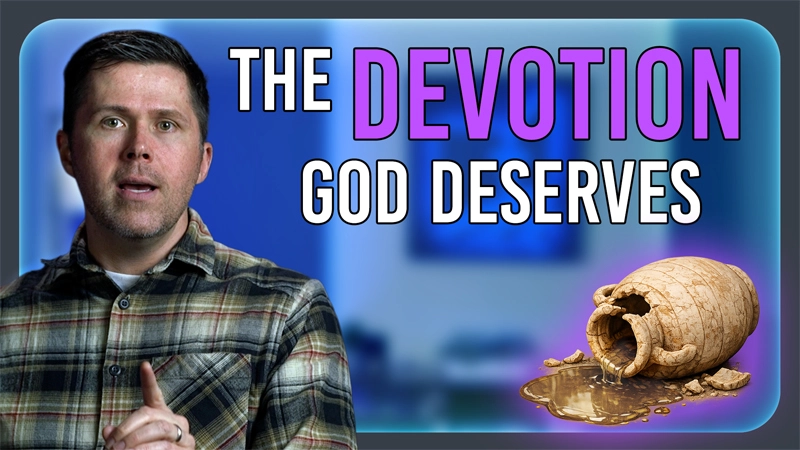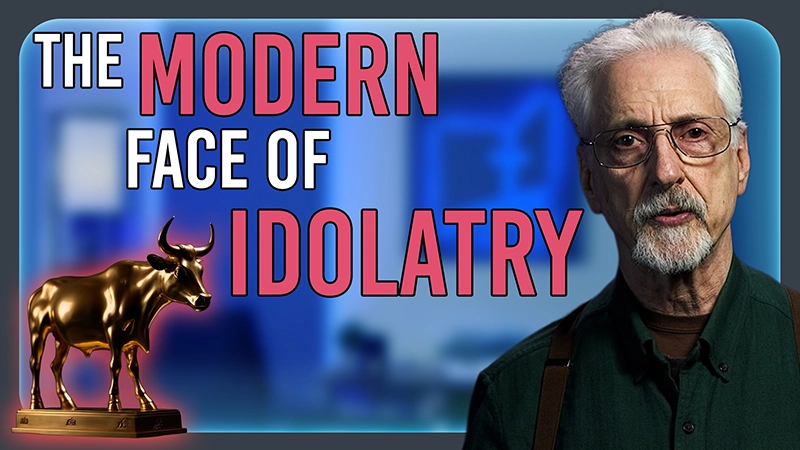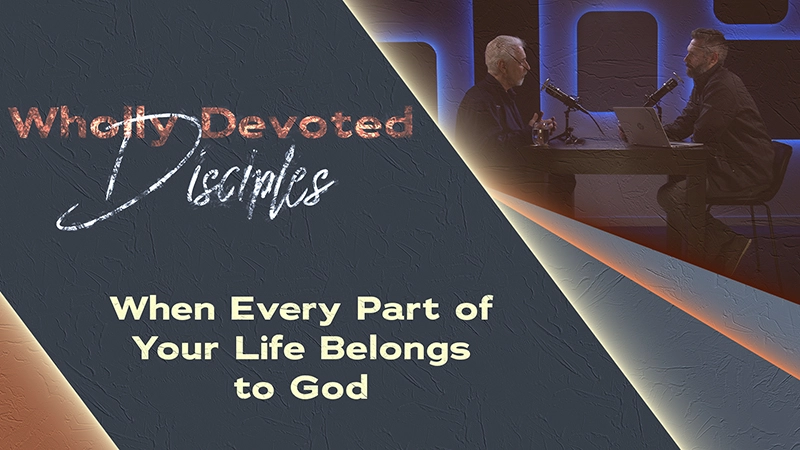
Timeless Truths: Don't Be Led Astray by the Deceitfulness of Riches
Timeless Truths: Every sincere Christian has made a decision to submit to the will of God. But that decision is going to be tested—especially in America. We’re surrounded by so much prosperity that, if we’re not careful, we can easily be drawn away from devotion to Christ and into a spirit of covetousness.
Host: Steve, as we continue our discussions in “Intoxicated with Babylon,” I want to start off by reading a quote by Henry Drummond. Henry Drummond was an evangelist during the 1800’s and a contemporary of Dwight L Moody. He wrote, “There is no happiness in having or in getting, but only in giving. Half the world is on the wrong scent in pursuit of happiness.” When you consider that was written in the 1800s, think about what could be written today about the kind of path that people are on in America and what they are pursuing for happiness. And there is no doubt that we have become a nation that is consumer driven, but America really didn't start out that way. How did we get to this level of a consumer driven life?
{{blog-bbaby="/blog-ads-storage"}}
Steve: Well, as in the case of practically everything, things happen in stages. America was mostly founded by the Puritans, and they had a very strong work ethic, which was in their minds tied directly to godliness. That was good and that started things in a certain direction. But when the industrial revolution hit in the mid-19th century, a shift began to happen in not only the minds of the great manufacturers, but also in the minds of Americans. Basically what happened was that manufacturers discovered a very powerful concept and that was selling on credit.
They discovered that if they could change the mindset that people had always had, which was to save their pennies, and change that mindset into one where they could buy it now on credit, it would make consumerism explode. And that's exactly what happened. So, advertisers and marketers took over the whole process and created a desire driven economy rather than a need driven economy.
Host: It was interesting too that you wrote about the fact that advertisers really changed the way that we even looked at a product.
Steve: Yeah, because in the old days we had “Sears and Roebuck” catalogs with these little ink drawings of the product. But when the marketers stepped in, they discovered another profound concept and that was creating an atmosphere. Selling the sizzle instead of the steak, as they say. For instance, if they were selling a car, the billboards would show a picture of a happy family driving down a winding country road. It wasn't so much focused on the actual car as much as it was the experience, and people flocked in to buy products that they wouldn't have purchased before simply because of the process the advertisers were using in capturing their hearts.
Host: You know, Steve, as you describe it, it almost sounds like they were setting up a scenario for addiction in a way.
Steve: Well, that's basically what has happened on a wholesale level. The American public has become addicted to consumerism. And I believe the enemy is behind that because people are going deeper and deeper into debt. Most Americans have pretty big credit card debt, car debt, mortgages, and other things. It's a lot like the company store back in the 19th century when a mining company wanted to get workers to work in the mines. They had their own grocery store and the miners would purchase their products there against their paychecks, but what happened was they never made enough to pay for the goods. So, their credit grew deeper and deeper, and they couldn't leave the mines because they owed the company money. So, they became enslaved by the system and there was no way to get out.
Host: I would suspect that most Americans, maybe even most Christians, would listen to what you're talking about and would say, “Well, yeah, I see that. I see how advertisers are on my television every night. I see how magazines are trying to sell me all of this stuff.” But I would venture to say most Christians probably don't see anything wrong with this. But you see a spiritual problem at work here.
Steve: Well, according to Scripture there is. The Bible is very clear about the sinfulness of coveting things. In fact, we don't like to even consider such a thing, but Paul lists it in Ephesians 5 as one of the characteristics of someone going to hell. So, it is a serious matter, even though we don't hear about it preached on the radio and we don't hear it from pulpit sermons very often. I mean, how many pastors are railing on the sin of covetousness in their sermons? But the Bible sees it as a serious issue. So therefore, since the Bible does, so should we. And I think the real issue here is that covetousness can become a very powerful passion in a person's heart that will dominate them and dictate the way they live their lives.
Host: What is the real power of covetousness? What is the impact that it has on our life?
Steve: Well, it's just another form of lust. When we think of lust, we tie it immediately to sexual sin. It can be that, but it's the lust of the eyes in general. That's what the Apostle John described as one of the three lusts that are very affiliated with worldliness. And Jesus understood that this appetite could drive people in the way they think, the way they live, the way they spend their money, the way they go after money and the way they view life. He understood that once covetousness gets a hold of your heart, it dictates your lifestyle.
Host: Steve, we talked just a minute ago about covetousness in the sense of addiction. How do we fall into an addictive mode when it comes to covetousness?
Steve: Well, Solomon said that he who loves money will not be satisfied with money and there is a lot of truth to that. The plain truth of it is, the more a person has, the more a person wants. Materialism is very addictive, and the more stuff you get, the more it drives you into a lifestyle where you want more and more. Any kind of sin or lust operates that way, the more you give over to it, the more you feel you must have. So, the person who gets caught up in that kind of a mindset, they just go from one thing to the next. Nothing ever satisfies. And before you know it, your life has been spent and you're in the grave and it's all been for nothing.
Host: Yeah. Well, we sure see that with sexual sin. We absolutely see it with drug use, but how many Christians have stopped to think how much that is true about the materialism that's in their lives?
Steve: Well, I think that the problem is that it's all they've ever known. This is part and parcel for American Christianity. It's one of those ways that our culture has more to do with the way we live our lives than Scripture.
Host: You make maybe the most important point on this topic in your book where you essentially say that if we are living in covetousness, then despite what we may believe, we cannot also be living for God.
Steve: Yeah, because again, Jesus said it very clearly, “No one can serve two masters; for either he will hate the one and love the other, or else he will be loyal to the one and despise the other. You cannot serve God and mammon.” (Matthew 6:24, NKJV) And I don't mean to be a spoil sport or negative or whatever, it's just the reality that 90 some percent of professing Christians are living for mammon. They can tell themselves all day long they're not, but the reality is shown in their lives.
Host: Paul warned Timothy to flee from these things. There was an urgency about a need to turn from these things.
Steve: Yeah, that urgency is very reminiscent of the angels warning Lot, “Escape for your life. Don't look behind you lest you be swept away.” And there is an urgency here that we are being deceived by riches and that we need to do something drastic to protect ourselves from being swept away with this delusion.
Host: Well Steve, for those who may be sensitive to what God may be saying to them about their own life in this world as a Christian, is there a way out? What should a Christian do if they see that their life is being overcome by covetousness?
Steve: Well, I put in the book three simple steps. First is just to repent. Go to the Lord and study the subject of covetousness and get brutally honest with yourself. And then two, whatever you need to repent over, get that straight with the Lord and then change your perspective about your life with God and your whole mentality about purchasing things. We don't have to have everything we want and we don't have to have everything we want right now.
Host: And probably shouldn't.
Steve: Yeah. So we just need to change our attitude. And the third thing is that if you have credit card debts, then you should establish a plan to pay them off. The bottom line is that we just need to simplify our lives. Jesus said do not lay up our treasures upon earth. And He went on to say we must lay up our treasures in heaven. And you know that's the real issue here. If we are believers, if we are living with an eternal mindset, then there is a payoff here. This isn't just a negative message of don't do this and don't do that. What the Lord is saying is, listen, there are untold riches waiting for you. And that's what Jesus is saying. Don't live for the temporal trinkets that the enemy offers but live your life for God and then you'll have riches awaiting you when you get to heaven.
















